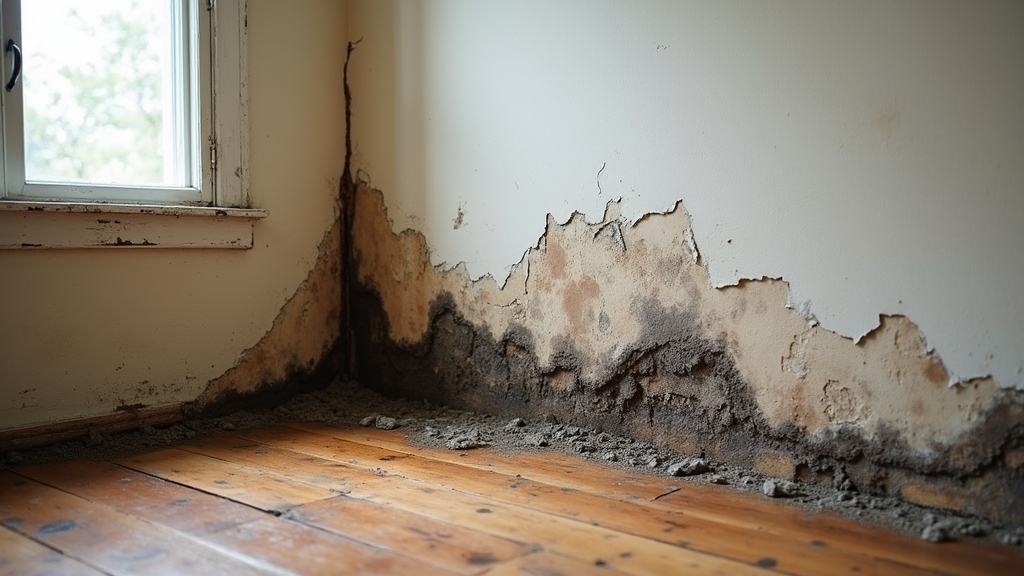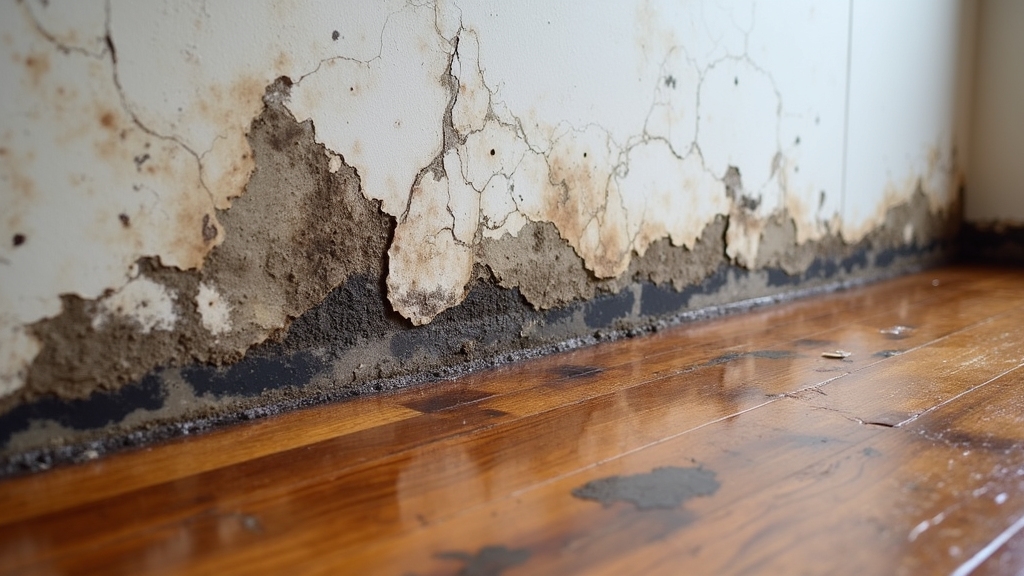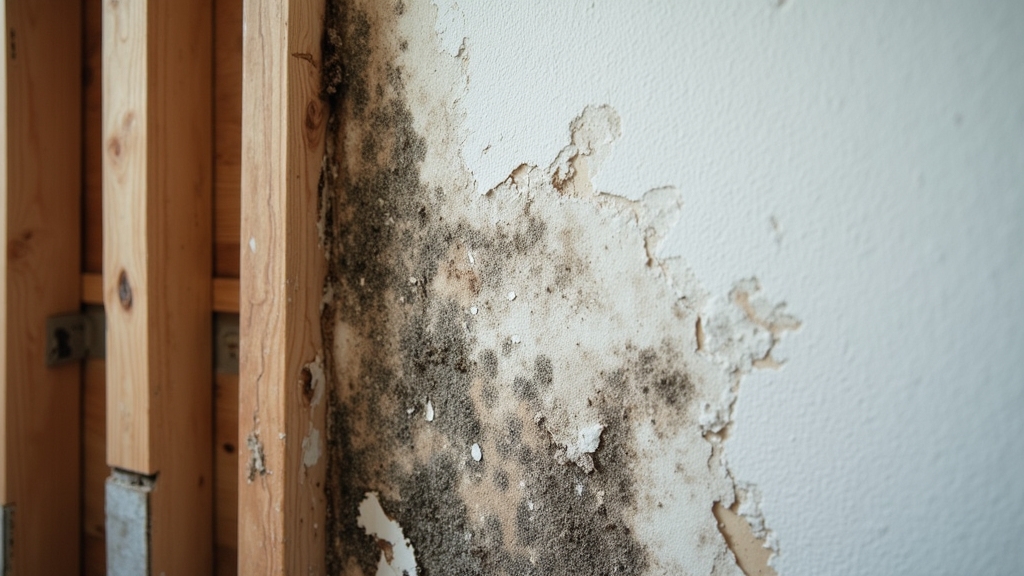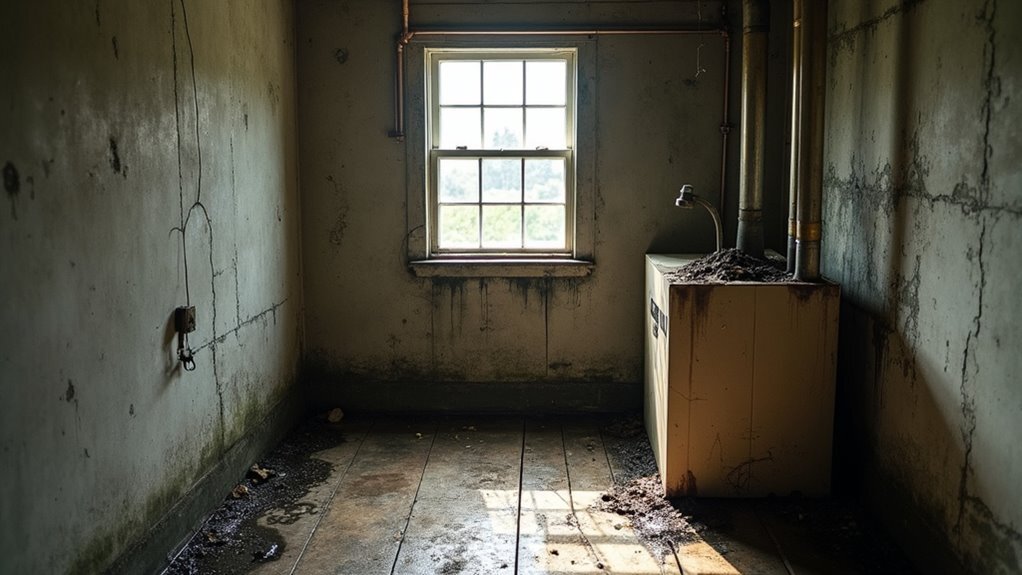Water damage is a serious concern during home inspections and sales. Stains, smells, or warped floors can signal hidden problems. Buyers and sellers often fear these signs because they can lower a property’s value or delay a sale.
Unresolved water issues can lead to mold, rotten wood, and expensive repairs. Lenders may refuse loans if damage is found. Both parties may face stress and unexpected costs when water problems are not addressed early.
Water damage can disrupt inspections, lower home values, and complicate sales. The good news is that you can prevent most of these issues.
Quick repairs and honest disclosure protect everyone involved. This blog will guide you through spotting, fixing, and handling water damage during inspections and sales.
Common Sources of Water Damage in Homes

Most water damage in homes comes from a few main sources. Common causes include leaking roofs, burst pipes, and broken appliances. Poor drainage and clogged gutters can also lead to problems.
Plumbing leaks are a frequent issue. If you do not fix these leaks, you may waste water and harm your home. Old caulking and unsealed windows can let water inside, too. Addressing water intrusion risks promptly can help prevent extensive damage.
Basement seepage and bathroom overflows often cause damage. HVAC systems can leak if not maintained. If you ignore these risks, repairs can become costly and complicated.
Regularly check for signs of water or moisture. If you find small leaks, fix them quickly. Routine inspections can help prevent bigger problems and protect your home’s value. Understanding water damage effects can guide you in maintaining your home effectively.
Signs Inspectors Look For During Evaluations
Inspectors look for signs of water damage during home evaluations. They focus on areas where water problems often start. Early detection helps avoid expensive repairs and protects the home’s value.
Inspectors check basements for water stains or white mineral deposits called efflorescence. They also look at ceilings and walls for discoloration or bubbling paint. If they notice these signs, it may mean there was a leak.
Plumbing fixtures get close attention for rust or pipe leaks. Floors are checked for warping or soft, spongy spots. If any of these issues are present, further investigation is needed.
Understanding common challenges in selling a home during divorce can help homeowners prepare for potential issues that may arise during inspections and sales.
Hidden Dangers Beneath the Surface

Water damage can hide beneath clean surfaces in a home. Underground leaks often go unnoticed until they cause major problems. If water seeps under floors or behind walls, it can damage the home. Rapid detection methods can help identify these hidden issues early. Hidden leaks may also lead to mold growth. Mold can harm building materials and lower air quality. Health can be at risk if mold remains undetected.
Additionally, distressed properties are more prone to unseen water damage due to neglect or delayed maintenance. Inspectors use special tools to find these hidden dangers. A clean home does not always mean it is free from water damage. If you plan to buy or sell a house, request a detailed inspection.
Structural Issues Linked to Moisture
Moisture can cause serious problems to a home’s structure. Water from leaks or flooding can weaken beams, joists, and floors. This damage may lead to expensive repairs if not fixed quickly. Working with cash home buyers can expedite the sale of a water-damaged property, helping owners avoid prolonged exposure to further deterioration. cash home buyers can often close quickly, providing a solution for homeowners dealing with moisture-related issues.
Wood can rot and metal parts may rust when wet. Signs like sagging floors or cracked walls often mean moisture is present. These problems lower a home’s value and make selling harder. If you see signs of water damage, act fast to stop further harm. Regular checks and quick repairs help keep the structure strong. Addressing moisture early protects both the home and your investment.
Mold and Mildew: Health and Safety Concerns

Mold spores may cause allergies or breathing problems, especially in people with asthma. You might notice dark stains on walls or a musty smell indoors. Peeling paint or warped floors can also be signs of mold.
To prevent these issues, it’s important to conduct a title search and resolve any outstanding liens or disputes that could complicate property ownership and maintenance. If you see or smell mold, you should act quickly. Cleaning up moisture and fixing leaks can help prevent mold growth. Protect your health by keeping your home dry and well-ventilated.
Impact on Home Appraisal Values
When water damage shows up during a home inspection, you can expect your property’s market value to drop, often sharply. Appraisers factor in both visible damage and the projected cost of repairs, which can raise red flags for lenders. As a result, you may face tougher loan approval conditions or even lower offers from buyers.
Utilizing cash buyers can help mitigate some of these issues, as they are less concerned with appraisal values and repair costs. Additionally, accepting a cash offer can bypass approval uncertainties, ensuring a smoother and faster sale process.
Decreased Property Market Value
Water damage lowers your property’s market value. Appraisers notice signs of water issues and often reduce the home’s appraised price. If inspectors find water damage, buyers may offer less money.
Buyers may imagine warped floors, peeling paint, or musty smells. These problems make your home less attractive. If the home seems risky, buyers may lose interest.
Water damage can also make selling your property take longer. If you want to sell quickly, it is important to fix any water issues. Repairing damage can help protect your home’s value.
Increased Repair Cost Estimates
Water damage increases the cost of repairs for a home. Appraisers lower a home’s value to reflect these extra repair costs. If your home has basement flooding or pipe leaks, the appraiser will note both visible and hidden problems.
They look for issues like mold or damage to the structure. Appraisers use contractor quotes and local market data to estimate repair costs. If repairs are expensive, your home’s value will drop by that amount.
You can expect a lower appraisal if you have water problems. Knowing how these repairs affect value helps you plan for selling or refinancing your home. If you fix the problems before the appraisal, you may protect your home’s value.
Loan Approval Challenges
Loan approval can be difficult if a home inspection finds water damage. Lenders may delay approval or add extra conditions in these cases. They do this to protect their investment.
Basement flooding and roof leaks lower the home’s value. Appraisers must consider repair costs and the extent of water damage. A lower value can make loan approval less likely.
The appraisal report may mention stained ceilings, warped floors, or mold from water issues. It could also point out water in crawl spaces. These signs tell lenders the home needs repairs.
Lenders may ask you to fix water problems before approving a loan. Some may offer less favorable loan terms. If you repair the damage and keep records, the process may move faster.
Disclosure Requirements for Sellers
Sellers must tell buyers about any known water damage or related problems. This is a legal requirement when selling a home. If sellers do not disclose these issues, they could face legal trouble.
Disclosure includes leaks, flooding, and mold, even if repairs were made. Buyers depend on this information to decide if they want the home. Sellers should keep records of repairs and inspections.
A clear property disclosure helps prevent future legal issues and builds trust with buyers. Accurate records protect sellers from future disputes. Honest disclosure helps build trust with buyers. Being clear about past issues can make the sale go more smoothly.
Understanding the importance of full transparency ensures sellers meet legal obligations and foster a smoother transaction process.
Negotiating Repairs After an Inspection
Negotiating repairs after an inspection means discussing fixes with the seller based on inspection results. Focus first on repairs that affect safety or the structure. If water damage is found, address this early in talks.
Start repair negotiations by prioritizing safety and structural issues, addressing any water damage as an immediate concern after inspection.
Ask for repair estimates from contractors to understand real costs. Decide if the seller will fix the issues or give a price reduction. If the damage is severe, you may face delays for insurance or repairs.
Walk through the home with the seller to point out damage. Compare the benefits of a cash credit versus waiting for repairs. Use reports from professionals to support your requests. Stay organized during these talks. If you are clear and assertive, you can protect your investment.
Additionally, reviewing public records can provide insight into previous water issues or repairs on the property, helping inform your negotiations.
Understanding home inspection procedures and common water damage signs can also strengthen your position during negotiations.
Insurance Implications for Damaged Properties
When water damage affects a property, you’ll need to consider how it impacts your insurance coverage and potential claim outcomes. Insurers may limit or deny coverage based on the source of damage and the property’s maintenance history. You should also prepare for challenges during the claim process, such as documentation requirements and possible disputes over liability.
Understanding the importance of timely transactions can help you navigate the complexities of selling or insuring a water-damaged home more effectively. Additionally, being aware of how insurance policies handle water damage claims can influence your decision to repair or sell the property in its current condition.
Impact on Policy Coverage
Water damage can change the condition of your property and affect your insurance coverage. Insurers often limit coverage or require extra payments in flood zones. Some types of water damage are not covered by standard policies.
If you do not use water-resistant materials, your risk increases and your coverage could be limited. Pre-existing water problems might make your policy invalid. Insurance companies will also check how well you have maintained your property.
You should read your policy to learn what it covers and what it excludes. If you live in a flood zone or have had leaks before, be extra careful. Understanding your policy helps you avoid unexpected expenses when making a claim.
Claim Process Challenges
Filing an insurance claim for water damage can be a difficult process. Insurance companies may question your documents or the cause of the damage. You must give clear proof, like inspection reports and repair estimates.
Some insurers deny claims if they think the damage is not covered or is due to neglect. This can cause delays in repairs or home sales. Knowing your policy’s details helps you avoid surprises.
If you and your insurer disagree, you might need a public adjuster or legal help. Careful record-keeping can protect your interests during the process. Clear and prompt communication with your insurer is important.
Costs of Professional Water Damage Remediation
Professional water damage remediation costs depend on several factors. The main factors are the amount of damage, what materials are wet, and how large the area is. Insurance might cover some costs, so check your policy first.
The price can go up if extensive repairs are needed. Replacing drywall, flooring, or insulation after water exposure is expensive. Costs also rise if the area needs advanced drying equipment.
If mold is found, remediation will add to the total bill. Mold removal often includes replacing materials and treating surfaces. Always confirm what your insurance will pay before starting any work.
Preventative Measures for Homeowners
Homeowners can prevent water damage by taking simple steps. Waterproofing basements, crawl spaces, and foundations keeps moisture out. If you install these barriers, you reduce the risk of costly repairs.
Gutters and downspouts should be checked regularly. Blocked or damaged gutters can let water collect near your home. If water is not directed away, your foundation may get damaged.
Plumbing needs routine maintenance. Look for leaks, rust, or blockages in pipes and water heaters. If you fix small problems early, you avoid bigger issues later.
Leak detectors in kitchens and bathrooms can give early warnings. If you install them, you will notice leaks before major damage occurs. Responsible care helps if you plan to sell your home in the future.
How Water Damage Affects Mortgage Approval
When you’re seeking a mortgage, water damage can lower your property’s value and raise red flags for lenders. They’ll see unresolved issues as an increased risk, which can lead to higher rates or even denial of your loan. It’s essential to understand how these factors shape your approval odds before moving forward.
Impact on Property Value
Water damage can lower a property’s value. It may also make it harder to get a mortgage for the home. Lenders and buyers worry about the risks and repair costs.
Inspectors use tools to check for water stains and hidden moisture. If they find damage, lenders may require repairs before approving the loan. Buyers might feel unsure about the house’s safety.
A home with water issues often gets a lower appraisal. Sellers may need to fix problems before closing. If you fix water damage early, you can avoid delays and get a better price.
Lender Risk Assessment
Lenders carefully check for any signs of water damage during a risk assessment. Water damage can mean hidden problems or expensive repairs. If an inspection finds water issues, lenders may worry about the risk of loan default.
Lenders might ask for repairs or lower the loan amount. Sometimes, they will not approve the loan until the issues are fixed. Early repairs show lenders the property is well maintained.
If you take care of water problems before applying, your chances of approval improve. This can lead to a smoother loan process. Proper maintenance helps avoid extra questions or delays from the lender.
The Role of Drainage and Landscaping
Drainage and landscaping affect how water moves around your home. Good drainage keeps water away from your foundation. If you ignore drainage, water can cause damage that is hard to see.
Poor drainage can push water toward your house and create hidden problems. These issues may become clear during a home inspection. Inspectors look for soggy soil, water marks, or sloping mulch near your house.
If downspouts empty too close to your home, water can enter your basement or crawl space. Mulch or flower beds that angle toward the house can also direct water inside. Fixing these issues can help protect your home’s value.
If you address drainage and landscaping problems early, you may avoid expensive repairs. A well-drained yard can make your home safer and more appealing. Good landscaping choices help protect your investment in the long run.
Choosing the Right Professionals for Assessment and Repair
Choosing the right professionals is key for proper assessment and repair of water damage. If you select skilled experts, they can find hidden problems and fix them correctly. This helps protect your home and keeps it safe.
Selecting skilled professionals ensures hidden water damage is detected and repaired, safeguarding your home and keeping it safe.
Certified inspectors know how water affects your home’s structure. They can find damage that is not easy to see. If you live in a flood zone, choose inspectors with local experience.
Licensed contractors who specialize in water mitigation offer the best repairs. Always ask for references and check their credentials. Make sure they have insurance before any work begins.
If you follow these steps, you can avoid future problems and protect your investment. Careful hiring ensures your home stays safe from water damage.
Conclusion
If you address water damage early, you can avoid major inspection issues and delays in selling your home. Homebuyers and inspectors will notice even small moisture problems. Taking care of leaks and drainage helps keep your home attractive and valuable.
If you worry about repairs or want to sell quickly, Limitless Homes of KC can help. We buy houses for cash, even if they have water damage. You do not have to handle costly repairs or stressful negotiations.
If you are ready to move forward, we are here to assist you. Contact Limitless Homes of KC for a fast, simple sale. Let us help you sell your home with ease today.

